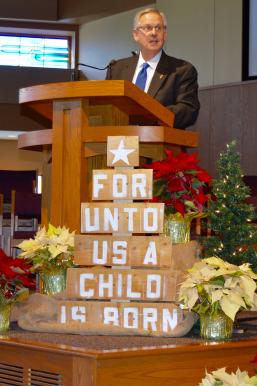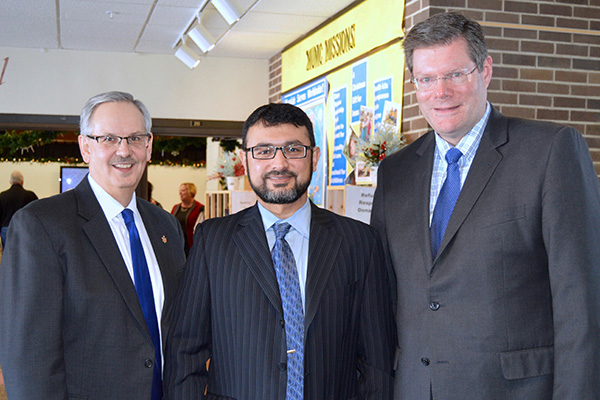
Is peace possible?
This article represents a portion of a homily that Bishop Bruce R. Ough delivered Dec. 27 at Messiah United Methodist Church in Plymouth, Minnesota where he shared the platform with Dr. Tamim Saidi, chairperson of the Northwest Islamic Community Center in Plymouth. In light of the mounting anti-Muslim rhetoric in many places throughout our country, Bishop Ough and Dr. Saidi were asked to offer their reflections on peace from the Islamic and Christian traditions.
 I love those Christmases, less frequent now, when my entire family can gather to celebrate together. I remember one such Christmas several years ago when we all gathered at my parents’ home in Williston, North Dakota. It was one of the rare occasions when my brother and his then-young family from Houston, Texas, were able to join us. Their youngest son, Brad, whose wedding I officiated at this past October, was just two years old and had only seen his grandparents a couple of times. He had no trouble calling my father “Grandpa,” but he couldn’t figure out what to call my mother. On Christmas morning, Brad went running into their bedroom, jumped up on the bed and called out, with great urgency, “Wake up, lady! It’s Christmas!”
I love those Christmases, less frequent now, when my entire family can gather to celebrate together. I remember one such Christmas several years ago when we all gathered at my parents’ home in Williston, North Dakota. It was one of the rare occasions when my brother and his then-young family from Houston, Texas, were able to join us. Their youngest son, Brad, whose wedding I officiated at this past October, was just two years old and had only seen his grandparents a couple of times. He had no trouble calling my father “Grandpa,” but he couldn’t figure out what to call my mother. On Christmas morning, Brad went running into their bedroom, jumped up on the bed and called out, with great urgency, “Wake up, lady! It’s Christmas!”
Photo: Bishop delivering the homily on December 27, 2015 at Messiah United Methodist Church IN Plymouth Minnesota. Photo courtesy of Messiah UMC.
Wake up, lady! Wake up, man! Wake up, world! Wake up; it’s Christmas! Wake up: “For a child has been born for us, a son given to us; authority rests upon his shoulders; and he is named Wonderful Counselor, Mighty God, Everlasting Father, Prince of Peace” (Isaiah 9:6-7).
Wake up, for a child pierces through the world’s darkness and brings us Light. Wake up and behold the heavenly host praising God and saying, “Glory to God in the highest heaven, and on earth peace to those on whom his favor rests.” Wake up, for righteousness and peace have kissed each other.
Is peace possible? Is peace possible? It is not only possible; it is imperative! For Christians, the answer is an unequivocal and resounding, “Yes!” Peace is not only possible, but we believe that in and through the Incarnation—the Prince of Peace with us—the reign of God’s peace has already been initiated.
You may be thinking, “Wake up, bishop!” Wake up and smell the coffee! Are you sleep-walking? Wake up and look around. Where is this reign of peace ushered in by the Incarnation? You say the Prince of Peace is with us. But peace on earth is not winning out. You say the Light has pierced the darkness. But it seems pretty dark to us. Christians are being turned against their Muslim brothers and sisters. ISIS’s butchery and terror goes unchecked. The United States’ spending on armaments and military actions, this year alone, could provide a free education to every child in the world. And today alone, 30,000 children will die from preventable diseases and thousands more languish in refugee camps. “Wake up, bishop!” You say peace is possible now; but we are not so sure, and our hope is being overrun by fear—fear of our neighbors, fear of our police, fear of terrorism, fear that darkness is overcoming the Light.
Friends, here is what is missing: Peace is not possible without the second incarnation. The first Incarnation, which we celebrated on Christmas Day, is the coming of God into the world. The second incarnation is the birth of Christ within our hearts through the power and gift of the Holy Spirit. As Meister Eckhart, a medieval Christian mystic and theologian, wrote: “What good is it to me if this external birth of the divine Son takes place unceasingly but does not take place within myself? And, what good is it to me if Mary is full of grace, if I am not also full of grace? What good is it to me for the Creator to give birth to his Son, if I do not also give birth to Jesus in my time and my culture?”
Peace is possible when we, like Mary, surrender fully to God and become pregnant with Jesus—giving birth to the Prince of Peace in our time and our cultural context. This is exactly what Pope Francis meant when he, in his Christmas Day message to the world, called on all people of faith to “make peace grow.” And Jesus made it absolutely clear that the Gospel of Jesus Christ—the Gospel or Good News of peace—will not be realized on earth as it is in heaven unless we become peacemakers; unless we “make peace grow.” Remember what Jesus taught in the Sermon on the Mount: “Blessed are the peacemakers, for they will be called children of God” (Matthew 5:9). I love how Eugene Peterson in The Message paraphrases this teaching of Jesus: “You’re blessed when you can show people how to cooperate instead of compete or fight. That’s when you discover who you really are, and your place in God’s family.”
Consider this sacred truth—a truth in both the Christian and Islamic faiths: We were created by God to be stewards of all creation. We were created to make peace grow, not to destroy or deny or demean life—any life.
As United Methodist Christians, our witness has always been for peace. John Wesley, the founder of the Methodist revival movement, was a peace activist. The pursuit of peace is part of our Methodist DNA. Our historic position has been, and continues to be, that we believe war is incompatible with the teachings and example of Jesus. We deplore war and urge the peaceful settlement of all disputes among nations. We yearn for, work for and witness for the day when there will be no more war and people will live together in peace and justice (The 2012 Book of Discipline of The United Methodist Church, page 140).
A set of core values and spiritual practices form the foundation of our Methodist prophetic witness and our acts of compassion, love, justice, and peacemaking. These core values—these core spiritual disciplines—are: Do no harm. Do good. And stay in love with God (and our neighbors).
This way of living—doing no harm, doing all the good we can, and staying in love with God—is incompatible with the waging of war, the deplorable bigotry toward our Muslim brothers and sisters being espoused by many of our current presidential candidates, and the inhospitable attitude permeating our current immigration and refugee re-settlement policies.
Hospitality is one of the fundamental tenets of the three Abrahamic faiths. Each of our traditions teaches us to practice hospitality as an expression of Allah’s, Yahweh’s, God’s righteousness and reign. Jesus went so far as to teach, when we welcome the sojourner, the stranger, the other, we welcome Jesus himself. When we practice hospitality, we move from us choosing whom to welcome, value, include, or love to embracing the reality that it is God—it is Allah—who has chosen all to be welcomed, valued, included, loved.
Hospitality is the seed bed of peace and justice. It is out of a spirit and commitment to hospitality that we are called to make peace grow and to act justly.
Photo: (Left to right) Bishop Bruce R. Ough; Dr. Tamim Saidi, chairperson of the North West Islamic Community Center; and Rev. Steve Richards recently spoke at Messiah United Methodist Church about how people from different faith traditions are working for the same outcome: peace. Photo courtesy of Messiah UMC.

Peace, nurtured in the seed bed of hospitality, means we speak out against those who would demonize or persecute Muslims in a post-9/11, -Paris and -San Bernardino world. Howard Thurman, African American theologian, philosopher, and civil rights leader, reminds us that, “During times of war, hatred becomes quite respectable, even though it has to masquerade often under the guise of patriotism.”
Peace, nurtured in the seed bed of hospitality, means we stand with the immigrants, sojourners and refugees fleeing the brutality of terrorists and welcome all as if they were Jesus himself. Standing on this side of Christmas, we are reminded that Jesus and his parents fled to Egypt to escape the violent regime of King Herod. Jesus was a refugee.
Peace, nurtured in the seed bed of hospitality, means we oppose discrimination based on a religious or racial litmus test. The U.S. Constitution guarantees our hard-won commitment to religious freedom and liberty and justice for all. Peacemaking means defending these guarantees against any bullying or fear-mongering tactics that would ignore or mock them.
Peace, nurtured in the seed bed of hospitality, means we reject war and violence as a way to resolve disputes between nations and peoples.
Peace, nurtured in the seed bed of hospitality, means we practice the spiritual disciplines St. Paul advocated: “Bless those who persecute you; rejoice with those who rejoice, weep with those who weep; live in harmony with one another; do not be haughty; do not repay anyone evil for evil; live peaceably with all; do not overcome by evil, but overcome evil with good” (Romans 12:9-21).
Peace, nurtured in the seed bed of hospitality, means we advocate for all governments and religious traditions to uphold the common good of all God’s children—from every nation, race, language, and faith expression.
Is peace possible? Yes, because the prophecies have been fulfilled and the Prince of Peace became incarnate, became flesh, and lived among us. We are already a part of God’s kingdom and the reign of peace.
Is peace possible? Yes, because we, too, can give birth to the Christ in our time and our culture. We, too, can be pregnant with Jesus and carry the Prince of Peace into every relationship and circumstance of life.
Is peace possible? Yes, because we—you and me, our Muslim brothers and sisters, all persons of faith—can embrace, this very day, this very hour, Allah’s vision, God’s vision of peace with justice, love with compassion, and joy to the world. Wake up, man. Wake up, lady. Today, this very hour, we can decide to “make peace grow.” May it be so! Amen.